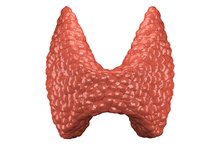Autoimmune Diseases That Cause Hair Loss
The immune system, which includes bone marrow, thymus, spleen, lymph nodes and the white blood cells, functions to recognize and eliminate foreign invaders. When the immune system fails to differentiate between foreign invaders and normal healthy cells, autoimmune disease results. About 80 to 100 autoimmune diseases have been identified, affecting 23.5 million Americans. Autoimmune diseases are considered a major health problem, according to American Autoimmune Related Diseases Association. Autoimmune diseases can affect every part of the body, producing a wide range of symptoms, including hair loss.
Alopecia Areata
Alopecia areata describes an autoimmune disease caused by the body’s immune system attacking the hair follicles. When white blood cells attack hair follicles, they interrupt hair growth leading to small round patches of hair loss. Alopecia areata affects approximately 2 percent of the United States population, most frequently children and young adults, according to the American Academy of Dermatology. In addition to scalp hair loss, alopecia areata can cause a loss any other hair, including the eyelashes, eyebrows and facial hair. The unpredictability of this autoimmune disease makes it frustrating, but because the hair follicles remain alive, hair regrowth can occur at any time, even after years of baldness.
- Alopecia areata describes an autoimmune disease caused by the body’s immune system attacking the hair follicles.
- In addition to scalp hair loss, alopecia areata can cause a loss any other hair, including the eyelashes, eyebrows and facial hair.
Lupus
Autoimmune Diseases That Cause Peripheral Neuropathy
Learn More
Lupus affects many different systems and organs in the body, creating a wide range of symptoms. Common symptoms include:
- fatigue
- headache
- painful joints
- anemia
- abnormal blood clotting,
- hair loss
Because these symptoms occur in many different disorders, lupus is often referred to as the “great imitator,” according to the Lupus Foundation, making it difficult to obtain a definite diagnosis 1.
Hashimoto's Disease
Hashimoto’s disease progresses slowly, producing few symptoms until the level of thyroid hormones drops significantly. Initial symptoms include fatigue and sluggishness. Additional symptoms, such as:
- hair loss
- increased sensitivity to cold
- puffy face
- hoarse voice
- unexplained weight gain
- muscle aches increase in severity if the condition remains untreated
Related Articles
References
- Lupus Foundation: What is Lupus?
- Phillips TG, Slomiany WP, Allison R. Hair Loss: Common Causes and Treatment. Am Fam Physician. 2017;96(6):371-378.
- Watras MM, Patel JP, Arya R. Traditional anticoagulants and hair loss: a role for direct oral anticoagulants? A review of the literature. Drugs Real World Outcomes. 2016;3(1):1-6. doi:10.1007/s40801-015-0056-z
- Urysiak-czubatka I, Kmieć ML, Broniarczyk-dyła G. Assessment of the usefulness of dihydrotestosterone in the diagnostics of patients with androgenetic alopecia. Postepy Dermatol Alergol. 2014;31(4):207-15. doi:10.5114/pdia.2014.40925
- Vincent M, Yogiraj K. A descriptive study of alopecia patterns and their relation to thyroid dysfunction. Int J Trichology. 2013;5(1):57-60. doi:10.4103/0974-7753.114701
- Peters EMJ, Müller Y, Snaga W, et al. Hair and stress: A pilot study of hair and cytokine balance alteration in healthy young women under major exam stress. PLoS ONE. 2017;12(4):e0175904. doi:10.1371/journal.pone.0175904
- Pratt CH, King LE, Messenger AG, Christiano AM, Sundberg JP. Alopecia areata. Nat Rev Dis Primers. 2017;3:17011. doi:10.1038/nrdp.2017.11
- American Academy of Dermatology. Alopecia Areata: Overview.
Resources
Writer Bio
Stephanie Chandler is a freelance writer whose master's degree in biomedical science and over 15 years experience in the scientific and pharmaceutical professions provide her with the knowledge to contribute to health topics. Chandler has been writing for corporations and small businesses since 1991. In addition to writing scientific papers and procedures, her articles are published on Overstock.com and other websites.








